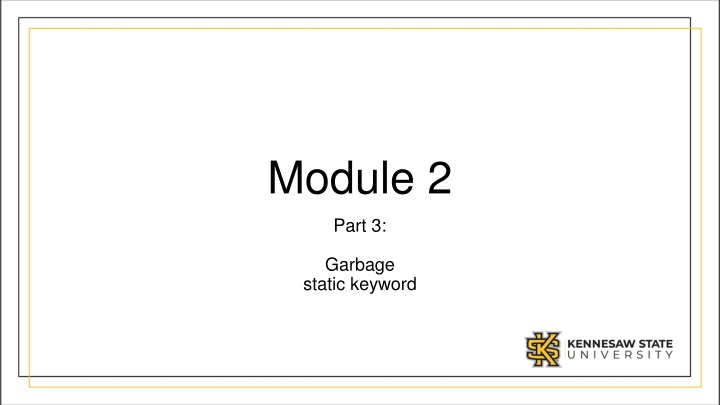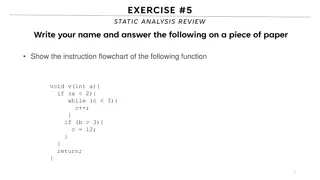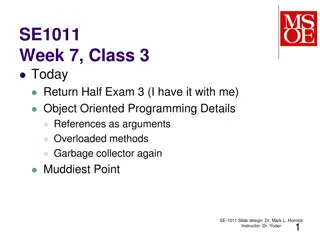
Garbage Collection and Static Keyword in Java
Explore examples of garbage collection in Java, learn about the role of the garbage collector in managing memory, and understand the concept of static keyword in classes. Discover how unused objects are cleaned up by the garbage collector and the significance of static variables and methods in Java programming.
Uploaded on | 2 Views
Download Presentation

Please find below an Image/Link to download the presentation.
The content on the website is provided AS IS for your information and personal use only. It may not be sold, licensed, or shared on other websites without obtaining consent from the author. If you encounter any issues during the download, it is possible that the publisher has removed the file from their server.
You are allowed to download the files provided on this website for personal or commercial use, subject to the condition that they are used lawfully. All files are the property of their respective owners.
The content on the website is provided AS IS for your information and personal use only. It may not be sold, licensed, or shared on other websites without obtaining consent from the author.
E N D
Presentation Transcript
Module 2 Part 3: Garbage static keyword
Examples of Garbage: What happened in Main? First we defined an attribute called a, which was of type Number On the next line we create a new Number object on top of a What happened to the Number object that contained 5? It s gone!....Sorta class Number { int x=7; public Number(int x) { this.x=x; } } class Main { public static void main(String[] args) { Number a = new Number(5); a = new Number(8); } }
Lets look at this example: class Number { int x; a public Number(int x) { this.x=x; } } Number x=5 class Main { public static void main(String[] args) { Number a = new Number(5); a = new Number(8); } }
Lets look at this example: class Number { int x; a public Number(int x) { this.x=x; } } Number Number x=5 x=8 class Main { public static void main(String[] args) { Number a = new Number(5); a = new Number(8); } }
Lets look at this example: This number object is no long referenced by any variable a It is considered garbage Number Number x=5 x=8 Soon the garbage collector will come along and remove it.
What is a garbage collector? A task that runs in the background. Any object that you create that is no longer in use, is cleaned up by the garbage collector There is no guarantee of when it will be cleaned up If the garbage collector is too aggressive it could hinder performance of your program, so it tends to run when your program is waiting on something like user input.
Static Keyword In this section we ll discuss: Static variables Static methods Static classes (briefly)
Variables/Attributes in an object class Number { int x; a b public Number(int x) { this.x=x; } } class Main { public static void main(String[] args) { Number a = new Number(5); Number b = new Number(8); } } x=5 x=8
Separate x attributes Notice how each object has its own x attributes. Changes to the x attribute in object a will have no effect on changes to the x attribute in object b Each student is a separate object. You all have a name attribute However, the value of each of your name attributes is likely different from eachother.
What if you needed a shared variable? Imagine you write a set of classes to mimic a fast-food restaurant. One class you write is fryCook. Your restaurant has 3 fryCook objects. Each fryCook produces a new set of fries every 15 seconds. Where should you store the fries? One option is each fryCook has their own ArrayList of fries This isn t great for the person packing orders, because they have to ask each fryCook if they have any Fries. Another option is that all fryCooks share an ArrayList of fries, that they can put their fries into. Now the order packer just look in the shared ArrayList This could be implemented as a static ArrayList in the fryCook class.
Static Variables/Attributes Unless you specify otherwise, all attributes in objects are independent from each other. i.e. object a and object b both have name attributes, but their values are independent. A static variables (a.k.a class variables) is shared among all instances of a class. i.e. object a and object b both have a maxHeight variable, that holds the SAME value in both objects because it s shared. If a updates the static attribute, both a and b see the change. A variable become static by adding the reserved word static e . g. static int noOfCars =0; Constants (final) are often declared static since you only need one copy of the constant.
Example of static attributes class Dog { static int dogCounter = 0; // Shared by all dogs private int dogID; // Each dog has its own copy Dog() { dogID = dogCounter++; } } Dog d1 = new Dog(); // d1 s ID is 0, dogCounter is now 1 Dog d2 = new Dog(); // d2 s ID is 1, dogCounter is now 2
Why use a static variable? class KSU { public static int next_id=0; private int id; Probably the most common example is when you need to count how many objects of a given class are created, or you need to number those objects. Think of KSU IDs. Each Student/Faculty/Staff is a separate object Thus each person needs their own unique ID in their object However, somewhere you must keep track of the last ID you assigned. This would be the static variable in your class KSU public KSU { id=next_id++; } }
Static Methods A Static method (A.K.A class method) are invoked through a class name An object is not instantiated A method becomes static by adding the static reserved word to the method header: public static int carCount () The main method in Java is static: public static void main() A static method can access only static variables and local variables
Static Method Example class Dog { static int dogCounter = 0; private int dogID; Dog() { dogID = dogCounter++; } static void allowed() { dogCounter *= 2; } static void notAllowed() { // Won t compile dogID = 10; } } Dog d1 = new Dog(); d1.allowed(); Dog.allowed(); Dog.notAllowed(); // Why doesn t this work?
Adding methods to your main class You may have noticed that if you add a method to your main class, you have to declare it static. This is because the main method is static, so everything it calls must be static.
Static Variables - Example public class factoryWorker { public class StaticTest { public static void main(String[] args) { factoryWorker fw = new factoryWorker(); private String name; private int empId; private static int nextId = 1; int n = factoryWorker.getNextId(); System.out.println("Next available id=" + n); public int getId() { return empId; } } } public void setId() { empId = nextId; // set id to next available id nextId++; } public static int getNextId() { return nextId; // returns static field } }
Commonly used Static Method Math Class abs () min() max() sqrt() Integer Class parseInt() Double Class parseDouble()
Static Classes Not critical to understand at this point. It is possible, but not common to create classes inside of classes. You ll see an example of this in the Data Structures module near the end of the course. When you do that, you can declare the inner class static. It can only access static members of the outer class This is not something we ll test you on here, we just want you to be aware it exists.
Summary Garbage is any attribute that is no longer accessible. Garbage collector will clean them up eventually Static variables are common across all instances of a class Static Methods can be accessed using a class name The reserved word static is used to identify a variable or method as static






















